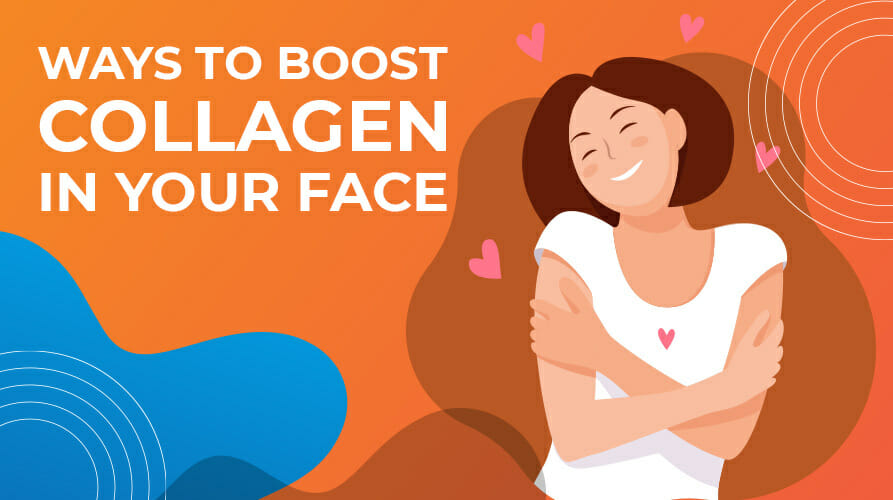If you have been observing the signs of dullness and decreased face health, then probably you are experiencing collagen loss. However, there are a lot of things you can do to boost collagen levels in your body.
Today collagen has become a buzzword with the skincare industry thriving on it. Let’s find out what collagen is, why it is important, and some ways to boost collagen.
What is Collagen? Why is Collagen important for skin?
Collagen is a richly found protein in our body. It takes upto 75% of our skin and serves as a primary constituent of bones, ligaments, muscles, and hair. Consider it a glue that holds all these together.
Collagen Benefits for skin:
1. Controls Skin’s Elasticity
Higher the collagen levels, the higher the skin elasticity. As it aids in holding onto moisture and improves the density of fibres within the skin. This gives a youthful appearance.
2. Delays Aging
Lower levels of collagen wear out the bond between different skin layers. This could lead to early or premature aging too. Visible signs of aging include fine lines, wrinkles, flat cheeks, and under-eye hollows.
3. Hydrates Skin
Skin hydration is another important benefit that collagen offers. It also reduces sun damage and prevents skin from thinning.
However, with time and age, collagen levels begin to deplete. It is our body’s normal process. But several factors speed up this process.
What can cause collagen damage?
1. Too Much Sun Exposure
It is a proven fact that too many UV rays can degrade skin health. It impacts collagen structure in our skin which lowers the level faster than normal aging. As per a study, sun rays can alter the DNA of the cells that produce collagen. Wrinkles and freckles are the two most common symptoms of collagen decline due to the sun.
2. Smoking
Smoking is injurious to health including your face too as it considerably affects the oxygen supply to your face. Tobacco contains a chemical called nicotine that limits the blood vessels’ capacity to deliver oxygen to our tissues. In return, tissues can not regrow and repair causing collagen to weaken.
3. Stress
Stress is a known factor in so many conditions including reducing face glow. Stress increases the levels of cortisol, a hormone that looks after the body’s stress response. Researchers have found a link between too. High stressed body produces less collagen.
4. Other Factors
Other reasons for collagen decline are:
- Age
- Genetics
- Lifestyle choices like diet
- Pollution
- Free radicals
Ways to boost collagen
1. Hydrolyzed collagen supplement
Following a whole diet with all vitamins and minerals. The best option is to take a hydrolyzed collagen supplement. People fear that they have side effects but it isn’t true. Studies consider them a good alternative if you lower collagen levels.
Collagen is a protein that breaks down into smaller amino acids so that our body absorbs it for further use. Hydrolyzed collagen is already broken down into smaller pieces so that our body can easily absorb collagen.
2. Vitamin C
Vitamin C helps boost collagen production. Our body can not produce it directly. So we get Vitamin C from the food we consume. It supports collagen production and prevents skin pigmentation.
Try raising its consumption. Vitamin C sources are oranges, blueberries, broccoli, black currant, bell peppers, etc.
3. Plant-based bakuchiol serum
Usually, you will see retinoids or retinol in beauty creams and serums that work on wrinkles and facial lines too well. But retinol is a chemical-based component that has a negative impact on your skin in the long run. That is why it is recommended to use bakuchiol, a plant-based natural alternative.
Bakuchiol enhances our skin’s ability to boost collagen production and provides tons of other benefits. Like banishing dark circles, pigmentation, and premature aging.
4. Sunblock
Sunscreens or sunblocks are an absolute must when you step outside in the sun. Excessive exposure to UV rays can quicken collagen breakdown and your face begins to wear out. All the glow disappears.
Regular application and reapplication of sunscreen can protect the skin from various conditions like wrinkles, dark spots, fine lines, and discolouration.
5. Antioxidant-rich foods
Antioxidants shield skin from free radicals and rejuvenate it. They are powerful anti-aging agents and are needed to produce enzymes to boost collagen.
Foods that are rich in antioxidants are blueberries, green tea, cinnamon, thyme, basil, tomato, garlic, spinach, nuts, seeds, and more.
6. A proper sleep
Lastly, a good 8 hours long sleep. Maintaining a proper sleep schedule is necessary for collagen to build up. Sleep deprivation prompts stress and reduces antioxidant defenses in our bodies.
Also, many damaged tissues and fibers are healed during the sleeping process.
